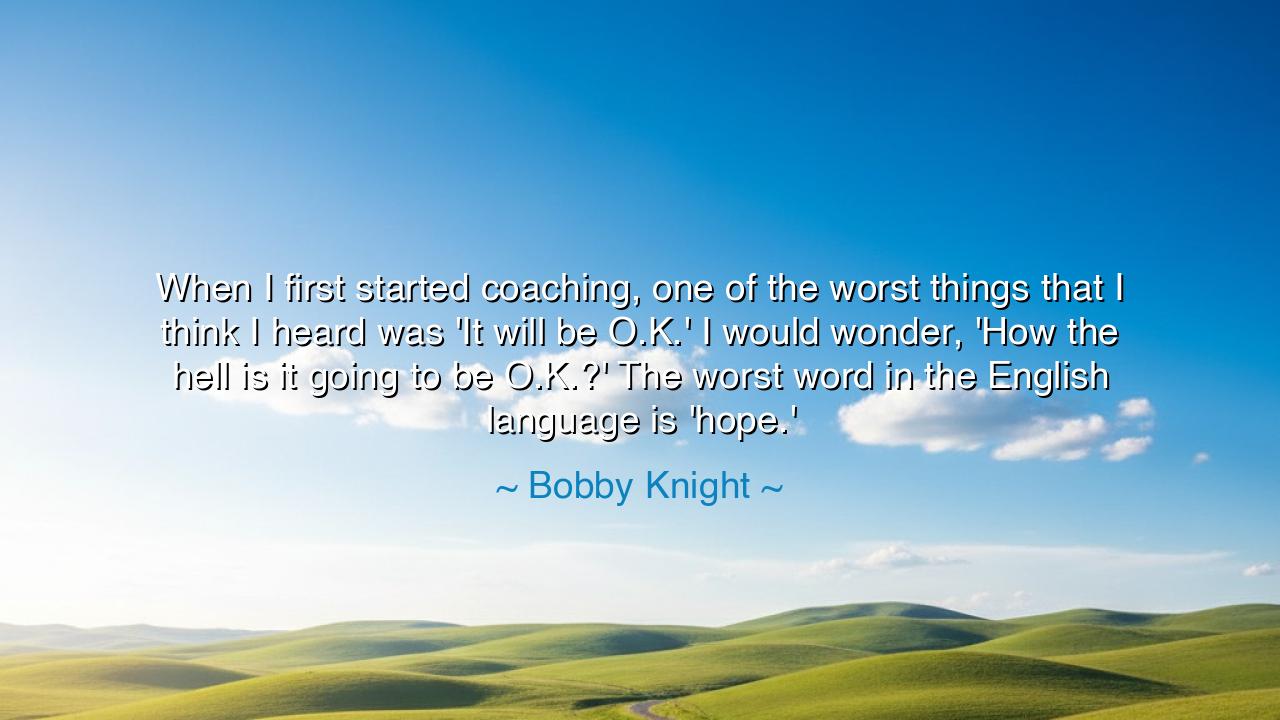
When I first started coaching, one of the worst things that I
When I first started coaching, one of the worst things that I think I heard was 'It will be O.K.' I would wonder, 'How the hell is it going to be O.K.?' The worst word in the English language is 'hope.'






“When I first started coaching, one of the worst things that I think I heard was ‘It will be O.K.’ I would wonder, ‘How the hell is it going to be O.K.?’ The worst word in the English language is ‘hope.’” Thus thundered Bobby Knight, the fiery coach of champions, a man known as much for his temper as for his relentless pursuit of excellence. To the untrained ear, these words may sound harsh, even cynical—but beneath their steel lies a truth forged in the fire of discipline and achievement. Knight was not condemning optimism itself, but the passivity that too often hides behind it. He saw “hope” not as strength, but as a substitute for action—a soft pillow upon which the weak rest their dreams instead of standing to build them.
In the ancient world, the wise men of every age warned against empty hope. The Stoics taught that one should not rely on fortune, but on virtue and preparation. The farmer who hopes for a good harvest but does not till his soil will reap only weeds; the sailor who hopes for calm seas but neglects his ship will be wrecked when the storm comes. Knight, though a man of the modern age, spoke in the same spirit. To him, victory was not born of wishing, but of work—the daily, unglamorous grind of mastery. He despised the comfort of “It will be O.K.” because he knew that nothing becomes O.K. unless men make it so through labor, sacrifice, and will.
Knight’s philosophy arose from the battlefield of competition, but its roots reach into all human endeavor. To “hope” without effort is to relinquish control over one’s fate. It is the cry of one who stands idle before the gates of opportunity, praying they will open by themselves. True strength, Knight believed, comes from certainty born of preparation—from knowing, not hoping, that one has done all that can be done. The athlete who says, “I hope I win,” has already surrendered his spirit; the one who says, “I am ready,” commands his destiny. Thus, for Knight, “hope” was the language of excuse, not excellence.
History itself bears witness to this truth. Consider the example of Alexander the Great, who, when facing the vast Persian army, did not hope for victory—he planned for it. He trained his men until their formations were flawless, their loyalty unbreakable. When his generals hesitated before the impossible odds, he did not soothe them with “It will be O.K.” Instead, he declared, “There is nothing impossible to him who will try.” In that resolve lay his triumph. For hope alone is wind, but discipline is the sail that captures it and turns it into forward motion. Without preparation, hope drifts; with purpose, it conquers.
Bobby Knight’s rejection of “hope” was therefore not the rejection of spirit, but the exaltation of responsibility. He demanded from his players a devotion to craft so complete that chance itself would be rendered powerless. “Don’t hope the ball goes in,” he might have said, “practice until it always does.” His creed was one of ownership—that every failure, every success, ev






AAdministratorAdministrator
Welcome, honored guests. Please leave a comment, we will respond soon